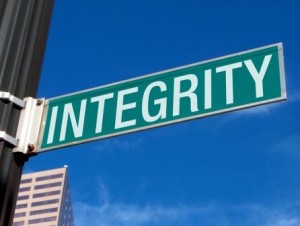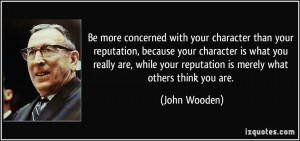I’m sure some will consider this entry to be in the “meddling” category but the non-stop news and uproar about Ray Rice, the assault on his girlfriend (who has since become his wife) and his subsequent punishment handed down by the NFL has caused me to contemplate a lot about the subject of “character”.
I’m not writing about Ray Rice, and certainly am not excusing his actions toward his girlfriend. In case you’ve been in a cave the last two weeks and don’t know what all the uproar is about, you can read about it here.

What troubles me is how society reacts one way when one person commits an offense but reacts in a completely different way when a similar or worse offense is committed by someone else. The difference in the reaction usually has to do with the position of the person who has committed the offense. Our society will castigate some and then turn a blind-eye towards, and even elevate, others. We are encouraged to treat an issue based on a person’s politics, money and power. Interesting how those things (politics, money and power) tend to change the way we look at people or the magnitude of the “offense”.
All this uproar brings into focus how moral relativism has become so prominent in our culture. We may say we believe that truth and morality are relative but we will then remark in horror about the absence of virtue and the rise of vulgarity. We are told that everyone has a right to their own opinion – except for those who believe that some opinions are better than others (but of course, we believe our opinion about them is better than their opinion about us).
Whatever happened to ‘character’? I’m not talking about the character of the offenders, but the character of the public who will either defend or castigate the offender based on our philosophical leanings. At some point in the discussion, someone usually throws “tolerance” into the mix. If you disagree with someone and point out the “wrongness” of something, you may be labeled as intolerant, depending on what they think about it.
This is very interesting because “tolerance” means to allow or to permit, to bear or put up with someone or something that is not necessarily liked. In other words, tolerance involves permitting or allowing a conduct or point of view you think is wrong while respecting the person in the process. Notice that it’s not possible to tolerate someone or something unless we disagree. We do not “tolerate” people who share our views. Instead, tolerance is reserved for those we think are wrong.
This presents us with a curious problem. Judging someone as wrong makes one intolerant, yet one must first think another is wrong in order to be tolerant. It’s a catch-22. According to this approach, true tolerance is impossible.
“Who are you to judge?” Ever heard that? This is silly, because to claim someone does not have a right to make judgments is itself a judgment about that person! It seems that in society, we want to hold to the view of moral relativism while trivializing those who apparently violate our rules against insensitivity, intolerance and political incorrectness. We want to have our cake and eat it, too.
Oh boy – moral relativism is tough to navigate – no wonder there’s so much turbulence in society!
Character demands a standard of right and wrong; otherwise, how do you describe someone of “good character” or how do you know it when you see it? Having any standard is to have no standard. We need a standard.
The late coach John Wooden said,
“Be more concerned with your character than your reputation, because your character is what you really are, while your reputation is merely what others think you are.”
He also said,
“The true test of a man’s character is what he does when no one is watching.”
We need more people of character – in business, in government, in our schools and in our homes. We don’t have the option to take it one place and not take it to another. Character is who we are.
